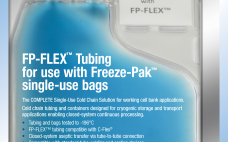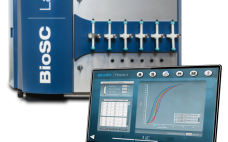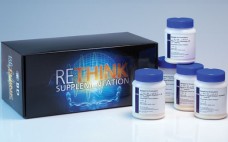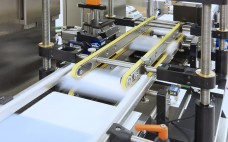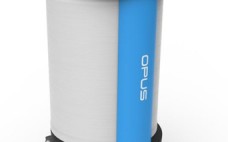This webcast features: Chris Shields, Director of Global Product Validation Services at Saint-Gobain Life Sciences. Extractable testing is traditionally performed by single-use suppliers, and while not required by industry regulations, it is the drug manufacturer’s expectation that this information form part of a product’s data package. Extractable and leachable testing is designed to determine the chemical compounds that may migrate into the customer’s fluid from the single-use product’s fluid contact layer. Extractable testing utilizes aggressive but relevant test conditions, while…
Webinars
Refolding of Biopharmaceuticals by FOLDTEC: A Case Study on Recombinant Thrombin
This webcast features: Dr. Andreas Anton, Director Bioprocess Development and Dr. Sebastian Schuck, Senior Manager Business Development, Wacker Biotech While WACKER’s own technology ESETEC® has proven highly efficient in producing soluble proteins and antibody fragments via secretion, poorly soluble substances form aggregated inclusion bodies within the cell, which contain incorrectly and/or incompletely folded target proteins. Recently Wacker Biotech introduced FOLDTEC®, its novel refolding technology for bioengineered pharmaceutical proteins. With this new technology, biopharmaceuticals that tend to aggregate can be efficiently…
Development of a Novel Thermoplastic Tubing, FP-FLEX and Single-Use Freezing Bag for Working Cell Banks Enabling Closed-System Processing to Temperatures as Low as -196 °C
This webcast features: Dominic Clarke, Global Product Manager, Charter Medical Working cell banks (WCB’s) are commonly applied to initiate cell culture manufacturing campaigns for production of recombinant or therapeutic proteins. These campaigns typically begin with inoculation of cells previously cryopreserved in cryovials. While cryovials are typically used in the development of WCB’s and initiation of manufacturing campaigns, they are not optimal for the growing demands of commercial production. Cryovials are small and filling/removal is performed through an open screw cap. This…
Product Quality Assessment using N-linked Glycan Analysis by LC-MS Supports Identification of Commercially Viable Cell lines for Biopharmaceuticals
This webcast features: Gareth Meek-Brown, Lead Scientist, Lonza Biologics – Slough Product Quality assessment during Upstream and Downstream Process Development is key to the production of safe and efficacious biopharmaceuticals. Critical quality attributes such as N-linked glycosylation are highly dependent upon biosynthesis conditions and play a crucial role in the pharmacology of therapeutic proteins, potentially affecting immunogenicity, pharmacokinetics and pharmacodynamics. The presence of N-linked glycosylation has benefits including increased thermal, physical and chemical stability over aglycosylated variants. The optimum N-linked…
Optimizing Cell Culture Productivity: New Findings on the Impact of Recombinant Protein Supplements
This webcast features: Harris Grevelis, Product Manager for Upstream Technologies at Repligen Cell culture supplements are essential for long-term growth and productivity of cell lines in serum-free media formulations. Both insulin and LONG®R3 IGF-I, a more potent supplement that directly targets and activates the IGF-I receptor, are employed by the biopharmaceutical industry today to support the growth of recombinant cell lines. This webinar will show how these two supplements, used separately and in combination, impact viable cell density and IgG…
Taking Medium and Feed Development Beyond Maximizing Protein Titer to Optimizing Glycan Distribution and Simplifying Process Scale-Up
This webcast features: Serena Fries Smith, Process Science Manager, Thermo Fisher Scientific In the early 2000s when many processes were struggling to achieve 1 g/L, maximizing titers was the industry’s biggest challenge and was essential to having favorable cost of goods and an economically viable product. Over the last 10-15 years, the industry has made significant advances in media and feeds. Due to these advancements, today a standard fed-batch process can typically achieve 3 g/L and some processes are achieving…
Simulation and Optimization Software for a Chromatographic Step
This webcast features: Thomas Flouquet, Area Sales Manager/Application Specialist for low pressure chromatography BioSC® Predict is the first simulation and optimization software for the development of chromatography processes dedicated to the purification of biopharmaceuticals. Its innovation was recognized at the Achema 2015 Awards in the Pharmaceutical Engineering category. With a few clicks, the user can easily generate batch, parallel batch or continuous chromatography recipes and directly run them on BioSC® technology, with any adsorption media. BioSC® Predict is driven by…
Cell Culture Media Supplementation: Effects of Peptones and CD Supplements on Performance and Protein Quality
Biotherapeutic protein production is driven by cell line, cell culture media and supplementation, and bioprocess. While improvements in cell culture media and supplementation have enabled significant advancements in bioproduction titers, optimization to meet the specific needs of individual production cell lines continues to be a key factor to achieving desired production and protein quality. This is especially relevant to the ever increasing number of biosimilar therapeutics. Not only is it desirable to achieve a cost effective level of production, it…
Secondary Packaging: Creating Value with Product Lifecycle Management
This webcast features: Daniela Guttmann, Product and Service Manager at Vetter, and Susanne Hall, Team Leader of Secondary Packaging at Vetter. Factors such as new regulatory requirements (e.g. serialization) and expenses associated with secondary packaging have created significant interest in Product Lifecycle Management (PLM). When incorporated early in the planning process, PLM can boost a product’s chance for success by helping to meet market requirements, and save costs. Watch the webcast on PLM for Secondary Packaging, and learn how it…
Production Scale Prepacked Chromatography for Use with 1000 L and 2000 L Bioreactors
This webcast features: Fletcher Malcom, Associate Director of Product Management at Repligen. The technical and economic benefits of ready-to-use, pre packed chromatography columns at bench- and small-scale have been proven and documented. The question remains: how do we scale up to production-scale? Now, for the first time, the new OPUS® 45 and 60 cm columns can purify a feed stream from a 1000L – 2000L bioreactor. This Ask the Expert webcast will show how the unique design of these GMP-scale…



